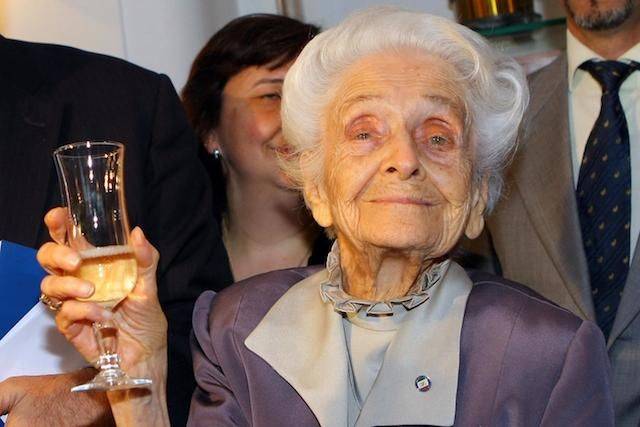Celebrating Women's History Month: Nobel Laureate Rita Levi-Montalcini (1909-2012)
ROME -March is Women's History Month, and our choice to celebrate is an exceptional Italian woman who had deep ties with the United States and international influence. Neurologist Rita Levi-Montalcini shared the Nobel Prize in Physiology and Medicine in 1986 with Stanley Cohen for discovery of the nerve growth factor (NGF), seen in the rapid growth of cancer cells. Her work has also contributed to studies of senile dementia.
Levi-Montalcini was born in Turin, Italy, in 1909, one of four children. Her family life was happy, and she described them all as particularly devoted to each other. Her father was an electrical engineer cum mathematician and her mother a talented amateur artist; her twin sister Paola, with whom she remained close throughout her life, was a successful artist in Italy. It was a problem that her father, however loving, did not want his daughters' studies to interfere with their presumed future life as wife and mother. But Levi-Montalcini persisted and eventually persuaded him that this would not be her future course. She was therefore allowed to resume her studies and graduated from high school, albeit belatedly, at age twenty. She continued with university studies in Turin and was graduated from medical school with a summa cum laude degree in surgery in 1936.
That very year, however, Mussolini imposed racial laws which prohibited non-Aryans from pursuing academic and professional careers. Her family was Jewish, and so she fled Italy for a post at a neurological institute in Brussels. But then Nazi Germany invaded Belgium, and in the Spring of 1940 she returned home, where she set up a research laboratory in her bedroom in the family home. One of her professors who had taught her previously, Giuseppe Levi, had similarly been obliged to escape from Belgium and returned to Turin, where he assisted her in the "lab" where she was conducting experiments on chicken embryos.
In 1941 Anglo-American air forces bombed Turin, and the family was forced to flee to a house in the country. For a time they successfully hid there, but when Piedmont too became dangerous they moved on to Florence, where Levi Montalcini made contact with partisan fighters and the famous non-Communist Partito d'Azione. Epidemics of typhus and other illnesses were afflicting the Florentines as well as the refugees flooding in from war-torn Northern Italy, and Levi-Montalcini was assigned to tend to these patients in a hastily built field hospital.
At the end of the war she returned to Turin with her family and to her interrupted academic career. However, in the autumn of 1947 she accepted an invitation from the University of St. Louis to continue her laboratory research there. From associate professor she rose to become a full professor, dividing her time between St. Louis and the Institute of Cell Biology at the Italian National Council of Research in Rome. Retiring in 1979, she continued there as guest lecturer.
In 1968 Rita Levi-Montalcini was only the 10th woman to be elected to the U.S. Academy of Scientists and then to the Pontifical Academy of Sciences in the Vatican. In 1986 she became the second woman of the 20 Italians to receive a Nobel Prize. Levi-Montalcini was named a Senator for Life in 2001. As a neurologist she spoke a number of times about aging and the brain, saying once: "I've lost a bit of my eyesight and a lot of my hearing. At conferences I attend I don't see the projections and I don't hear well. But I think more now than when I was twenty. The body will do what it wants. I am not the body: I am the mind."
Rita Levi-Montalcini died December 30, 2012.





































i-Italy
Facebook
Google+
This work may not be reproduced, in whole or in part, without prior written permission.
Questo lavoro non può essere riprodotto, in tutto o in parte, senza permesso scritto.